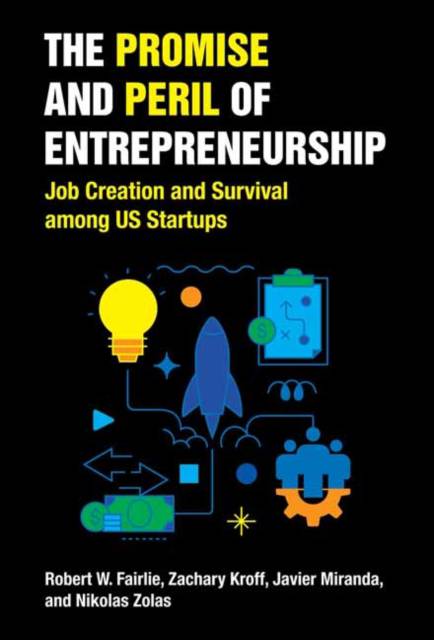
- Retrait gratuit dans votre magasin Club
- 7.000.000 titres dans notre catalogue
- Payer en toute sécurité
- Toujours un magasin près de chez vous
- Retrait gratuit dans votre magasin Club
- 7.000.000 titres dans notre catalogue
- Payer en toute sécurité
- Toujours un magasin près de chez vous
The Promise and Peril of Entrepreneurship
Job Creation and Survival Among Us Startups
Robert W Fairlie, Zachary Kroff, Javier Miranda, Nikolas Zolas
Livre broché | Anglais
59,45 €
+ 118 points
Description
A clearer view of entrepreneurship, based on new comprehensive data, that upends what we know about job creation and survival among US startups. Startups create jobs and power economic growth. That's an article of faith in the United States--but, as The Promise and Peril of Entrepreneurship reveals, our faith may be built on shaky ground. Economists Robert Fairlie, Zachary Kroff, Javier Miranda, and Nikolas Zolas--working with Census Bureau microdata--have developed a new data set, the Comprehensive Startup Panel, that tracks job creation and the survival of every startup in the country. In doing so, they recalibrate our understanding of how startups behave in the US economy. Specifically, their work seeks to answer three critical questions: How many jobs does each entrepreneur create? Do those jobs disappear quickly? And how long do entrepreneurial enterprises survive?
Job creation and survival rates are, the authors conclude, much lower than those reported by official federal sources. Such discrepancies emerge from the more comprehensive picture drawn from this new data set--a picture that, for instance, highlights the important but understudied differences between employer firms (startups that hire people) and nonemployer firms (startups that do not initially hire people but may do so in later years as they grow). This reframing captures the vast number of businesses that start with no employees, a number largely missing from the statistics underpinning the mythos of the riskiness of entrepreneurship. The book also explores who owns startups--focusing on differences by race and ethnicity. With its new, wider view of the realities of job creation and survival among startups, The Promise and Peril of Entrepreneurship has significant implications for economic policymaking and research, and for the billions of dollars that the government and the private sector invest in promoting entrepreneurship.
Job creation and survival rates are, the authors conclude, much lower than those reported by official federal sources. Such discrepancies emerge from the more comprehensive picture drawn from this new data set--a picture that, for instance, highlights the important but understudied differences between employer firms (startups that hire people) and nonemployer firms (startups that do not initially hire people but may do so in later years as they grow). This reframing captures the vast number of businesses that start with no employees, a number largely missing from the statistics underpinning the mythos of the riskiness of entrepreneurship. The book also explores who owns startups--focusing on differences by race and ethnicity. With its new, wider view of the realities of job creation and survival among startups, The Promise and Peril of Entrepreneurship has significant implications for economic policymaking and research, and for the billions of dollars that the government and the private sector invest in promoting entrepreneurship.
Spécifications
Parties prenantes
- Auteur(s) :
- Editeur:
Contenu
- Nombre de pages :
- 232
- Langue:
- Anglais
Caractéristiques
- EAN:
- 9780262545358
- Date de parution :
- 01-08-23
- Format:
- Livre broché
- Format numérique:
- Trade paperback (VS)
- Dimensions :
- 152 mm x 226 mm
- Poids :
- 294 g







